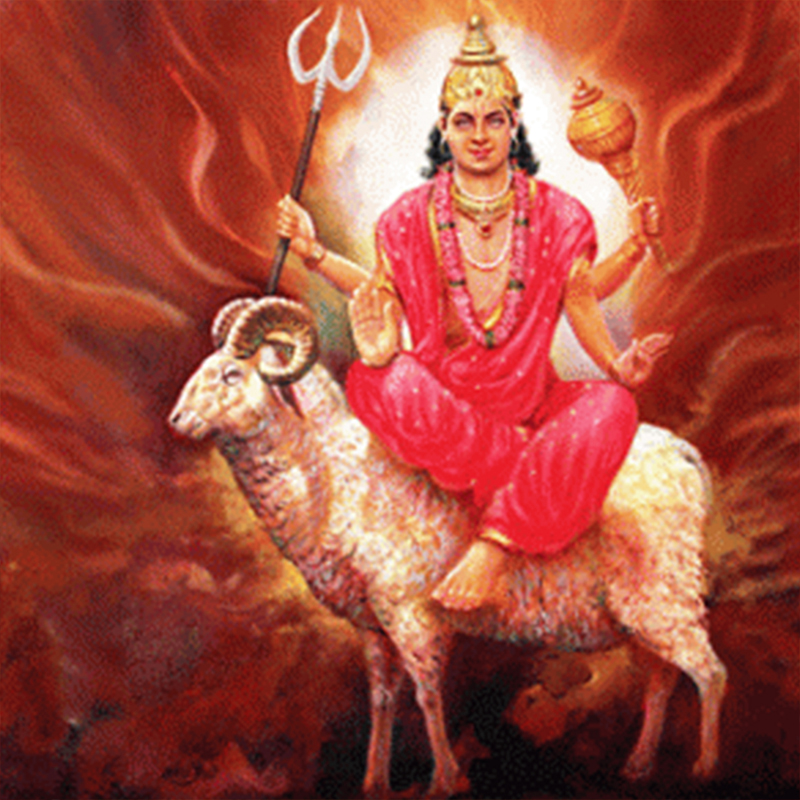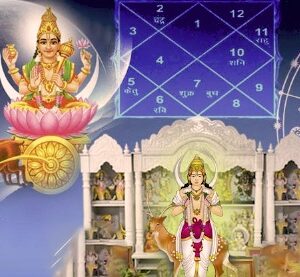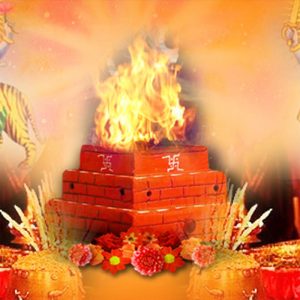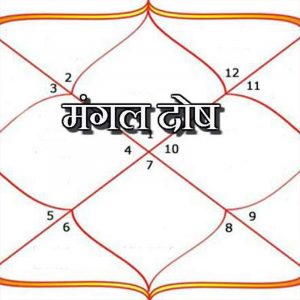Mangal (Mars) Mantra Siddhi Japa & Yagna
From: ₹9000
1,25,000 chants of Mangal mantra & Yagna to pacify malefics of planet Mars and bestow blessings.
Mangal is the god of Mars, the red planet. Mars is also called Angaraka (‘one who is red in colour’) or Bhauma (‘son of Bhumi’) in Sanskrit. He is the God of war and is celibate. He is considered the son of Prithvi or Bhumi, the Earth Goddess. He is the owner of the Aries and Scorpio signs, and a teacher of the occult sciences (Ruchaka Mahapurusha Yoga). He is of Tamas Guna in nature and represents Energetic action, confidence and ego.
He is painted red or flame colour, four-armed, carrying a trident, club, lotus and a spear. His Vahana (mount) is a ram. He presides over ‘Mangal-war’ or Tuesday.
In Vedic astrology Mangal is considered a malefic of the first order. He rules over the signs Mesha (Aries) and Vrishchika (Scorpio), is exalted in Makara (Capricorn) and has his fall in Karka (Cancer). The planets Sun, Moon and Jupiter are all considered friendly to him, while he is hostile to Mercury. Venus and Saturn are neutral. Mangal represents drive and physical energy, self-confidence and ego, strength, anger, impulsiveness, heroism and adventurous nature. Mangal rules over blood, muscles and bone marrow. He is also associated with battle, war and soldiers. Mangal is the lord of three nakshatras or lunar mansions: Mrigashirsha, Chitra and Shravishtha or Dhanista. Mangal has the following associations: the color red, the metal brass and gemstone red coral. His element is fire, direction is south, season is summer.
Mantra
om kram kreem kroum sah bhaumaya naham
1,25,000 chants of Mangal mantra & Yagna to pacify malefics of planet Mars and bestow blessings.
Mangal is the god of Mars, the red planet. Mars is also called Angaraka (‘one who is red in colour’) or Bhauma (‘son of Bhumi’) in Sanskrit. He is the God of war and is celibate. He is considered the son of Prithvi or Bhumi, the Earth Goddess. He is the owner of the Aries and Scorpio signs, and a teacher of the occult sciences (Ruchaka Mahapurusha Yoga). He is of Tamas Guna in nature and represents Energetic action, confidence and ego.
He is painted red or flame colour, four-armed, carrying a trident, club, lotus and a spear. His Vahana (mount) is a ram. He presides over ‘Mangal-war’ or Tuesday.
In Vedic astrology Mangal is considered a malefic of the first order. He rules over the signs Mesha (Aries) and Vrishchika (Scorpio), is exalted in Makara (Capricorn) and has his fall in Karka (Cancer). The planets Sun, Moon and Jupiter are all considered friendly to him, while he is hostile to Mercury. Venus and Saturn are neutral. Mangal represents drive and physical energy, self-confidence and ego, strength, anger, impulsiveness, heroism and adventurous nature. Mangal rules over blood, muscles and bone marrow. He is also associated with battle, war and soldiers. Mangal is the lord of three nakshatras or lunar mansions: Mrigashirsha, Chitra and Shravishtha or Dhanista. Mangal has the following associations: the color red, the metal brass and gemstone red coral. His element is fire, direction is south, season is summer.
Mangal Siddhi Japa & Yagna Mantra
om kram kreem kroum sah bhaumaya naham
Puja service includes: Ganpathi Smaran, Shaanti paath, Invocation of all deities, Nine planets invocation mantra (1 mala of each planet), Mangal yantra Puja, 1,25,000 chants of Mangal mantra, Mangal Havan (including 108 ahutis of Khadir wood), Mangal shanti donation in temple, Brahmin Bhojan.
Number of Priests: 12
Mangal Siddhi Japa & Yagna Mantra puja can be done:
Mangal Siddhi Japa & Yagna Mantra puja With 11000 chants 4 priests 5 hours 9000 INR
Mangal Siddhi Japa & Yagna Mantra puja With 21000 chants 12 priests 6 hours 33200 INR
Priests will perform Puja as per Vedic rituals based on birth details. Please mention your birth details (name, date, place, time), & Sankalp (your wish) at checkout. This is an individual Puja (you may do puja on individual name or include your near and dear ones in the puja). You will be provided with the direct contact no. of the priest, to call during the Sankalpa/Puja.
Additional information
| Japa | 11000 Chants, 21000 Chants |
|---|





![Kumbha mangal dosh nivaran puja [for female]](https://shreesarvasiddhi.com/wp-content/uploads/2022/12/Kumbha-mangal-dosh-nivaran-puja-for-female-300x300.png)



Reviews
There are no reviews yet.